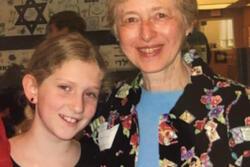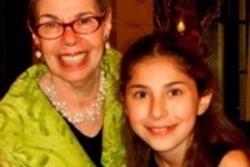Blazing a Trail, One Note at a Time
I’ve always considered words to hold a certain power. As the old saying goes, “the pen is mightier than the sword.” So, when I was sitting in the front row as my little brother was called to the Torah for the first time as a bar mitzvah, something struck me about the language of the event. Usually, the English translation in the siddurim (prayer books) follows the literal Hebrew on the opposite page, reading “God” for “Adonai” and “He” for “Hu.” But in the readings that day, God was genderless. The biblical Hebrew that has been passed down for millennia wasn’t changed, but the English translation avoided the use of any pronouns that would invoke gender.
I pondered this simple yet impactful change and wondered who was responsible. The woman to be thanked, it turned out, was standing right in front of me: Alisa Pomerantz-Boro, a close family friend, internationally-recognized hazzan, and the gracious service-leader for my little brother’s bar mitzvah.
I later asked Alisa why she decided to change the translation, to which she explained to me that we are all created b’tzelem elohim, in God’s image. Therefore, God can neither be simply male nor female, but must instead reflect the diversity of humanity.
It’s an interesting issue to consider, especially as Hebrew itself is a gendered language—literally every word is assigned a male or female identity. Alisa explained that, due to the historical weight of the traditional Hebrew, she doesn’t feel comfortable changing the actual Hebrew that is written down. But, seeing as any kind of translation is itself a form of interpretation, she feels okay about changing the translation to this non-gendered understanding of God.
As I would come to learn, a lot of Alisa’s activism stems from her own experience as a female clergy member within Judaism. Since a young age, she pushed traditionally accepted norms regarding women’s roles in Judaism. She was the only girl to wear a tallit in her synagogue, and she volunteered to read Torah on a Nativ trip during her senior year of high school—only to find out that it was an opportunity solely available to boys. Then, in 1991, she and 13 other pioneering women comprised the first cohort of women to be inducted into the Cantor’s Assembly. Now, she is the proud President of that very same organization.
Of course, not all of this trailblazing was easy. Alisa has been the first female clergy member in all three of the synagogues in which she has worked in her career as a hazzan, including the famous Park Avenue Synagogue in New York. Her role as a vocal female clergy member was often met with resistance, but she never let that stop her. She jokes that she never had to worry about people disliking her—she could always just attribute anyone’s discontentedness to their feelings regarding her gender identity.
Even now, despite her success both in her career and familial life, she still agitates for more—more change, more equality, more voices being lifted and heard. She says she’s grateful for the progress we’ve made, but stresses that there’s still much more work to be done.
It’s a feeling that I see reflected in many of my peers—the young feminists of my own generation. There’s an acknowledgement of the past, of those who came before us, but an anxious fervor regarding the future, too. Now more than ever we have the power to make institutional and cultural change. We’re seeing one of the largest national student-led movements since the Vietnam era, and we’re a part of it. We’re pouring out in the thousands to support a number of issues across the political spectrum, and we’re taking ownership of our voices, and their potential to enact change.
“Don’t think that we can stop fighting the fight,” Alisa says. “Everything we do and say matters. Don’t forget about the future.”
These words hold the weight of generations of pioneers and trailblazers like Alisa. But they also hold possibility as my peers and I raise our voices and hope to hear them amplified by all those who join in the chorus.
Alisa fought and overcame obstacles to have the life and career she wanted, and to make Judaism, and the world, better for the young women who came after her. It’s now my hope to do the same for the women who will come after me.
This piece was written as part of JWA’s Rising Voices Fellowship.








Very interesting!